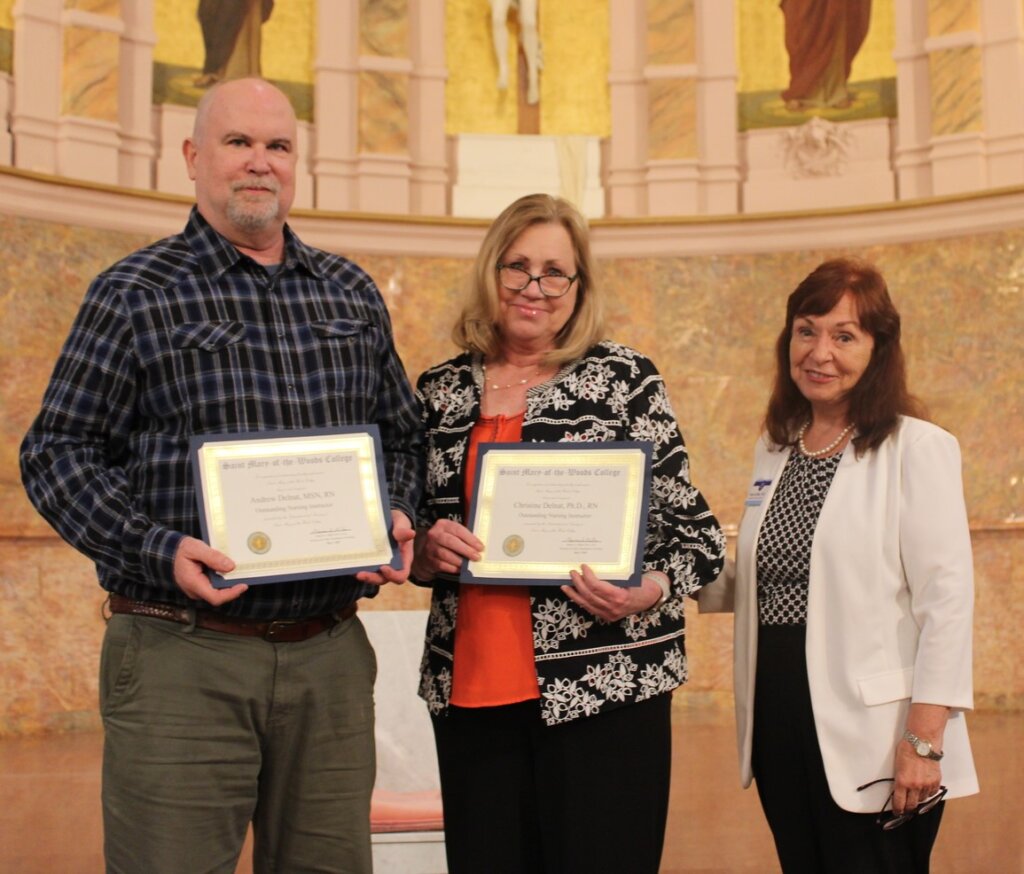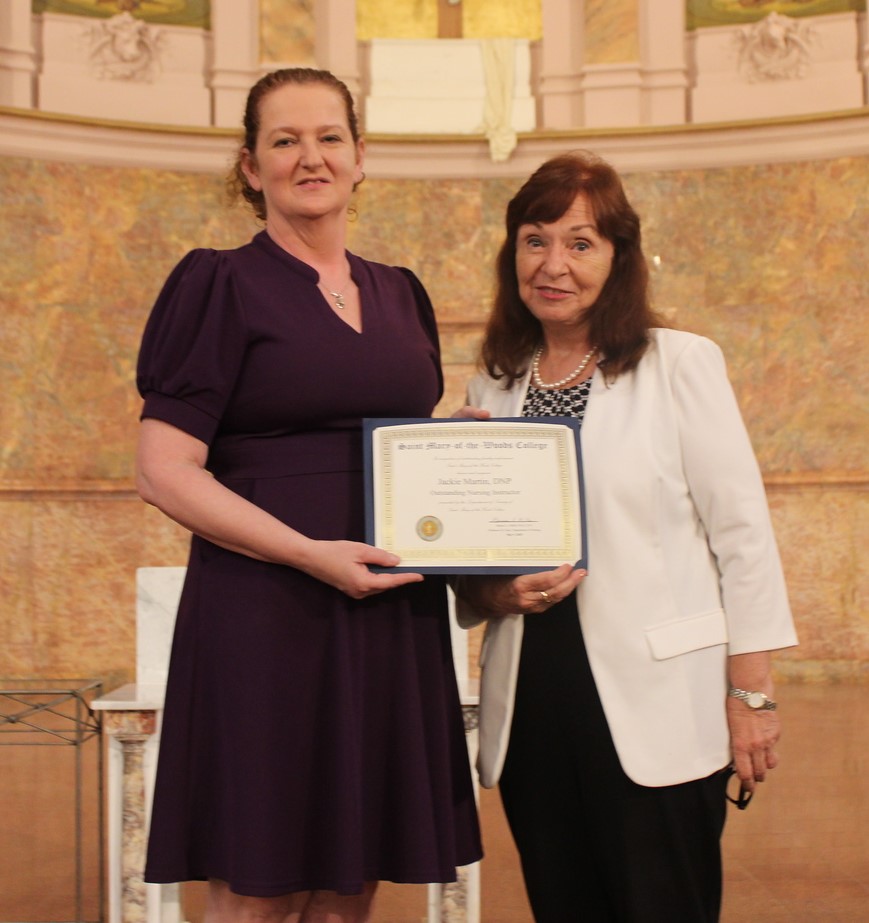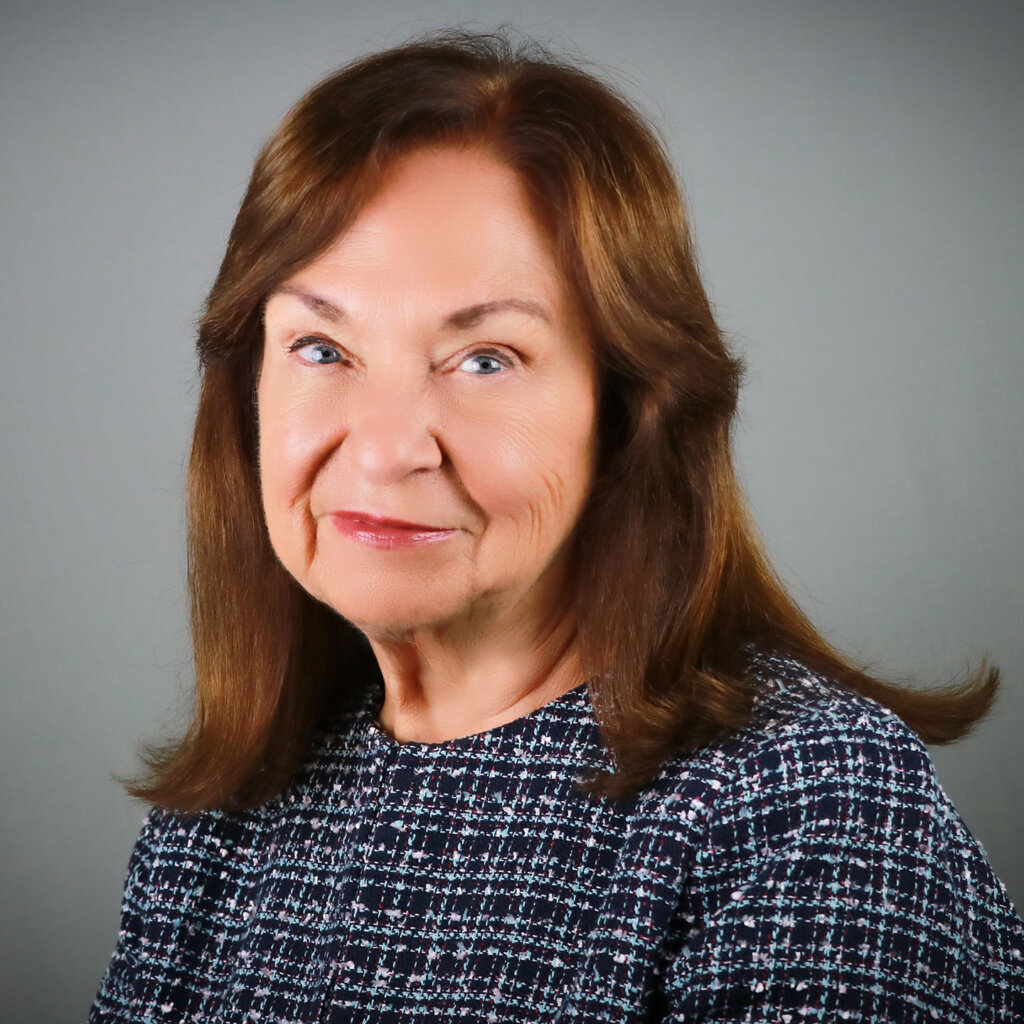Marcia Miller, Ph.D., RN, dean of the Division of Nursing and Sciences, shared these remarks during the 2025 Nursing Pinning Ceremony.
It is both an honor and a profound joy to provide the “Charge” to all the nursing seniors from both the traditional campus program and the online Paramedic to Professional Nurse program.
Tonight, we gather to celebrate these extraordinary individuals as they reach the level of a professional nurse. Today is not just about a pin. It’s about a pivot —earned through a moment of choice, of determination and of transformation.

When we reach a pivot point, it allows us to reflect on where we have come from and how we got here. It also allows us to anticipate the shift to the future and new expectations.
Your decision to be a professional nurse took courage and was not easy. Doubts such as, Can I really do this?, Who will watch my kids?, Can I balance working full-time and school or can I play a collegiate-level sport and still be successful? These are just some of the doubts you may have had.
Let’s take a moment to reflect on your past experiences. Each student has a unique path. Some joined as fast-track high school students, or transfer students from other nursing programs, some were home-schooled, others had experience as a certified nursing assistant, medical assistant, licensed practical nurse or paramedic. Each of them at some point made an important decision, a decision to be more, to be a professional nurse. The professional nurse is not just a competent technical nurse. The professional nurse has additional abilities in health promotion, application of research and leadership to promote positive changes in nursing and healthcare.
Your next successful characteristic was your determination. I cannot compliment you enough on your grit, perseverance and accountability. There were family get-togethers that you did not attend, there were parties that you missed and holidays that you were writing papers or completing your discussion board. There was anxiety about testing out for physical assessment, there were sleepless nights studying for tests, there were hours working on Patient Care Plans. There was also a sense of dread about every ATI test you have ever taken.

Now it is time to pivot to your new role. You are no longer going to get the nurse or ask the nurse, because you are going to be the nurse. How you think about safety, how you set priorities about what needs to be accomplished first, your use of time management and how to work together with others as a team will be expected.
It will take time to adjust to your new responsibilities. Remember to ask questions, find mentors and understand that it takes experience to feel comfortable in a new role. Dr. Patricia Benner says it will take you three years to feel competent and five years to be an expert. However, your career trajectory will not be a ladder, but more like a climbing wall, with twists and turns to different units and healthcare organizations. Even when you are not looking, new opportunities will find you. Allow yourself to take career risks and follow new interests.
There are a few things we want you to keep in mind: In order for you to care for others, you first must take care of yourself in body, mind and spirit.
Maintaining your physical health is critical. You need adequate sleep, even when you are working night shifts, healthy nutrition that does not include energy drinks and a routine fitness program to stay strong. Protect your back and knees so you can continue to work as long as you want.
For a healthy mind, you must remain a lifelong learner. There will always be new technology, new meds and new evidence-based practice policies. You will need to join a professional organization and order a nursing journal to keep your knowledge current. This is what is expected from a professional nurse.

As a human being, continue your development. Take time to explore the world! Travel, try different restaurants, read interesting books and appreciate all forms of art.
Your spiritual growth will also continue. Trying to relieve the pain of a patient diagnosed with cancer, or holding the hand of a dying patient, will cause you to have a deeper appreciation for your purpose in life. You will suffer grief as your role as a nurse is intertwined with the suffering and death of your patients. Respect and process these feelings so that they do not harden your heart.
We want you to have resilience and to try to maintain a work/life balance. This will require the use of your two Special Powers: Your ability to say “Yes” or “No” in any given situation. You must be able to rejuvenate your soul with joy and laughter alongside friends and family. Hold on to a sense of gratitude. Reflect upon something to be grateful for every day.
As you pivot, we are sending you out into the world to be the change agents, from changing the culture of a unit to a healthy work environment, to advocating for patients and influencing healthcare policy. You will be part of the driving force to transform quality healthcare.
As I have said many times before, we want you to know that you are never alone and that you will always be part of us and The Woods. We are just a phone call away when you have a difficult day, or when you need that letter for graduate school or a reference for a new job. We want to find out how your life unfolds. We greatly appreciate all that you have given, and all that you have given up, to reach this point and that you are our pride and joy! We are certain that as a nurse, you will make a difference. Saint Mother Theodore Guerin said, “We cannot do our work if we stay in the nest”. It is now time for you to pivot out of the nest. May the grace of God guide you and protect you as you continue in this noble profession of nursing.

Marcia Ann Miller, Ph.D., RN, is the dean of the Division of Nursing and Sciences at Saint Mary-of-the-Woods College. She earned a bachelor of science degree in nursing in 1974, and a master of arts in counseling psychology in 1976 from Ball State University. She completed a master’s degree in psychiatric nursing as a clinical nurse specialist from Saint Xavier University in Chicago in 1990. In 2004, she completed her doctorate degree from Indiana State University in higher education leadership. Miller has held faculty positions at both the graduate and undergraduate levels. She has been a faculty member at Ball State University, Purdue University North Central and Indiana State University. She has also served as the coordinator of distance nursing education, executive director of nursing and associate dean for academics and assessment in a college of health science.

0 Comments